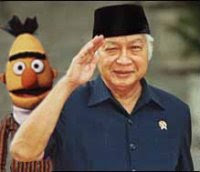No fewer than three English Premier
League clubs came to town as part of their pre-season warm ups last year
"He's football crazy,
he's football mad, football has gone and robbed him of the sense he ever
had." So run the lyrics of a popular British song from the 1960s, which is
perhaps an appropriate summation of a phenomenon that has now gone global and extended
its muddy tentacles all the way over to Indonesia
Indeed, so authentic was
the Premier League, big-screen, nonton-bareng (watch-together)
atmosphere, that my companion and I even feared a spot of British hooligan
fisticuffs from the bunch of local Man. U. fans filled with lager-fuelled
bonhomie who spilled out onto the street post game. The EPL has well and truly
arrived in a city that lies a full 12,000km from England
Well these chaps could save their bonus air miles this month, as three of the most famous football clubs in the
world, namely Arsenal, Liverpool and Chelsea, pitched up in Jakarta to
play a series of pre-season friendlies last July and to no doubt also shot a flurry of spray-on
deodorant commercials while they they were in town, a full four years after Manchester United cancelled
their Jakarta trip due to the (second) Marriott hotel bombing.
Arsenal arrived first, on July 14, followed by Liverpool on July 20 and finally Chelsea
Major world sporting
events have now become highly corporatised affairs. FIFA basked in USD 631
million in profits after the last World Cup in South Africa Cape
Town
Arsenal, Chelsea
and Liverpool played against a national 11 last year and it’s fair to
say that the Indonesian national team are no Brazil Brazil Indonesia
At the other end of the
economic spectrum, the English Premier League has gone into global overdrive
over the past decade, with the money side of the game spiralling to absolutely
absurd levels. Players salaries have inflated massively and the clubs that have
to pay them thus suffer from a kind of prune-juice effect, as revenues
generated immediately slide out the back door and into centre forwards' bank
accounts.
In order to bankroll all
of this largesse, oligarchs and mega-rich consortiums have moved in, the kind
of people who will presumably be first against the wall when the Occupy
movement storms the ramparts in its silly "V for Vendetta" masks. Chelsea Manchester City
is funded by Abu Dhabi
More deeply though, does
vegging out on a sofa watching people kicking a ball around, an event of
absolutely zero importance with regard to the political realities of people's
day-to-day lives, actually have any value? Perhaps, as has been suggested,
spectator sport is a crucial part of our social-indoctrination systems. It gets
people paying attention to something of no importance whatsoever and also
builds up feelings of irrational jingoism and group cohesion behind leadership
elements.
“Bah humbug!” I hear you
cry. Well, I have to confess that I was cheering and blowing my South
African vuvuzela into the earholes of local Arsenal fans last July 14.
The Indonesian national side may not be packing many budding Lionel Messis,
however the atmosphere down at Gelora Bung Karno can be quite electric on match
day. Shouting, chanting, lighting illegal flares, enjoying Mexican waves and a little
light pick-pocketing can all be yours. Admittedly, these three games were held in the middle of the fasting month but this didn't seem to put a
damper on the atmosphere too much.





